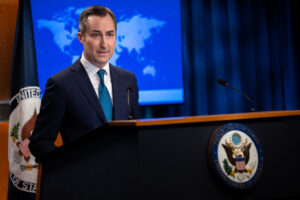UN, Council of Europe commemorate 1995 Srebrenica genocide
ANKARA (AA) – The leaders of both the UN and the Council of Europe on Thursday commemorated the Srebrenica genocide of Bosniak Muslims, which took place 29 years ago, in 1995, in eastern Bosnia.
“May the memory of Srebrenica strengthen our collective resolve to build a world free from the scourge of genocide, where justice & peace prevail,” UN Secretary-General Antonio Guterres said on X.
“We must fight against division and intolerance, stand up for human rights and promote mutual understanding and reconciliation,” he said.
Marija Pejcinovic Buric, secretary-general of the Council of Europe, said in a written statement: “Almost 30 years after the genocide in Srebrenica, this remains one of the darkest chapters in our continent’s history.”
“We think of the thousands of innocent men and boys, murdered solely because of their ethnicity and religion, and we honour their memory,” she stressed.
“The deep suffering of the families and loved ones of those killed stays with them. We pay tribute to their bravery and resilience.”
“Although this crime cannot be undone, we can learn from what happened and apply those lessons, so that such horrendous atrocities and human suffering are never repeated,” she urged.
“This means acknowledging the facts. There can be no place for denial, historical revisionism, or the glorification of convicted war criminals,” she said. “Looking to the future, we must actively embrace equality, diversity and mutual respect.”
She stressed: “We must also be clear that intolerance, hate speech and other forms of discrimination are a gateway to pain and suffering.”
“The Council of Europe will continue to stand firmly against these and to promote human rights, democracy and the rule of law as the right way forward for our societies,” she added.
Every year on July 11, newly identified victims of the 1995 genocide of Bosnian Muslim men and boys are buried in a memorial cemetery in Potocari in Bosnia and Herzegovina.
– Newly identified victims laid to rest –
This May, with overwhelming support, the UN General Assembly passed a resolution designating July 11 Srebrenica Genocide Remembrance Day.
The resolution, spearheaded by Germany and co-sponsored by more than 40 countries, calls for July 11 to be declared “International Day of Reflection and Commemoration of the 1995 Genocide in Srebrenica.”
The youngest victim to be buried this year is Beriz Mujic, 17, born in 1978 in Zvornik.
His remains were found 28 years after he was killed and were exhumed in May 2023.
He was killed in July 1995 in the Suceska area near Bratunac, and his remains were discovered and exhumed in the Srebrenica municipality area.
Mujic will be buried next to his brother Hazim, whose remains were laid to rest in 2013.
The body of their father, Omer Mujic, has yet to be found.
The oldest victim to be buried Thursday is Hamed Salic, born in 1927. He was 68 when he went missing in the summer of 1995 in the town of Zepa. His remains were exhumed in May 2014 and recently identified.
Thousands of people from various countries will attend the funerals and burials. Following this year’s funeral, the number of victims buried at the cemetery will reach 6,765.
– Srebrenica genocide –
In the spring of 1993, the UN Security Council declared the city of Srebrenica a “safe area.” However, Serb troops led by Gen. Ratko Mladic, who was later found guilty of war crimes, crimes against humanity and genocide, overran the zone.
Dutch peacekeeping troops responsible for safeguarding people in Srebrenica failed to act when Serb forces occupied it on July 11, ordering the killing of 2,000 Bosnian Muslim men and boys in a single day.
Approximately 15,000 Bosniaks fled to the surrounding mountains, but Serb troops hunted them down, killing an additional 6,000 male Bosnian Muslims.
Serb forces allowed women and children to reach Bosnian-controlled regions but massacred at least 8,372 Bosnian men in forests, factories and warehouses. The murdered Bosnians were cast off in mass graves, with bodies discovered in 570 different locations across the country, including 77 mass graves.
In 2007, the International Court of Justice in The Hague ruled that genocide had been committed in Srebrenica.
Efforts to locate the missing victims of the genocide have continued, with identified remains buried according to Islamic rituals at the Potocari Memorial Cemetery in a ceremony held every year on July 11.
On June 8, 2021, UN tribunal judges upheld a life sentence for Mladic for genocide, persecution, crimes against humanity, extermination, and other war crimes committed in Bosnia and Herzegovina.
This year, as the Srebrenica genocide of Muslims is commemorated, another genocide is ongoing in Palestine as the world watches it happen, unable to stem the bloody tide.








